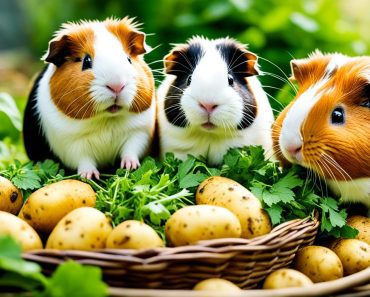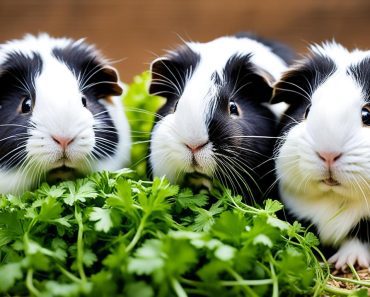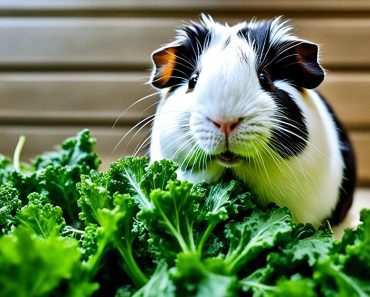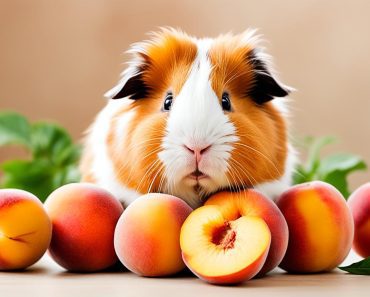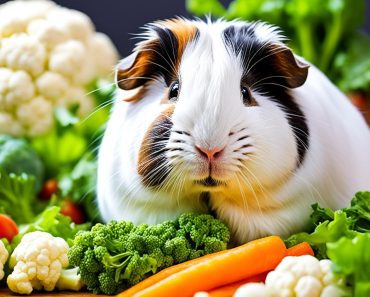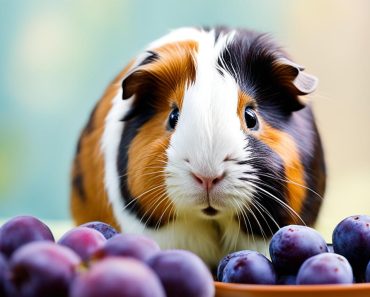If you’re a guinea pig owner, you may be wondering, “Can guinea pigs eat cherries?” Well, the good news is that guinea pigs can enjoy cherries as a treat! Cherries are packed with beneficial nutrients like vitamin C, calcium, and phosphorus, which can support their skin, bones, and immune system.
However, it’s essential to remember that cherries should be given in moderation and should not be a significant part of their diet. While there are benefits to feeding cherries to guinea pigs, it’s crucial to consider both the positives and negatives to make an informed decision for your furry friend.
Can Guinea Pigs Eat Cherries? Yes, they can, in moderation.
- Guinea pigs can eat cherries as a treat, but moderation is crucial.
- Cherries contain vitamin C, calcium, and phosphorus, which are beneficial for guinea pigs.
- Consider the risks and benefits before including cherries in your guinea pig’s diet.
- Thoroughly wash cherries, remove pits and stems before feeding them to your guinea pig.
- Monitor your guinea pig’s intake and consult with a veterinarian for optimal care.
The Nutritional Value of Cherries for Guinea Pigs
Cherries offer a wealth of essential vitamins and minerals that are beneficial for guinea pigs. They are particularly rich in vitamin C, a crucial nutrient that guinea pigs cannot produce on their own. Vitamin C plays a vital role in supporting their overall health and immune system.
Aside from vitamin C, cherries also contain calcium and phosphorus, both of which are essential for bone health and various bodily functions. However, it’s important to note that the calcium to phosphorus ratio in cherries may not be ideal for guinea pigs. Therefore, it’s essential to feed cherries to guinea pigs in moderation.
Benefits of Feeding Cherries to Guinea Pigs
Feeding cherries to guinea pigs can have several benefits. Cherries provide a natural source of vitamin C, which is essential for guinea pigs since they cannot produce it themselves. Vitamin C helps support their immune system and overall health. Additionally, cherries can contribute to hydration as they contain water, reducing the need for excessive water intake.
Cherries are not only a tasty treat for guinea pigs but also a nutritious addition to their diet. The vitamin C content in cherries helps strengthen their immune system, making them less susceptible to illnesses. It promotes the production of collagen, which aids in the healing process and supports healthy skin and connective tissues.
Furthermore, the hydration benefits of cherries can help ensure that guinea pigs maintain proper water balance. The water content in cherries helps to keep them hydrated, especially during hot weather or when they may not be drinking enough water.
It’s essential to note that while cherries offer these benefits, they should be given in moderation. Too many cherries can lead to digestive issues or an imbalance in the guinea pig’s diet. It’s best to introduce cherries gradually and observe how your guinea pig reacts to them.
Nutritional Value of Cherries for Guinea Pigs
Let’s explore the nutritional value of cherries for guinea pigs. The table below highlights the key nutrients found in cherries.
| Nutrient | Amount per 100g |
|---|---|
| Vitamin C | 7 mg |
| Calcium | 13 mg |
| Phosphorus | 11 mg |
| Water | 82 g |
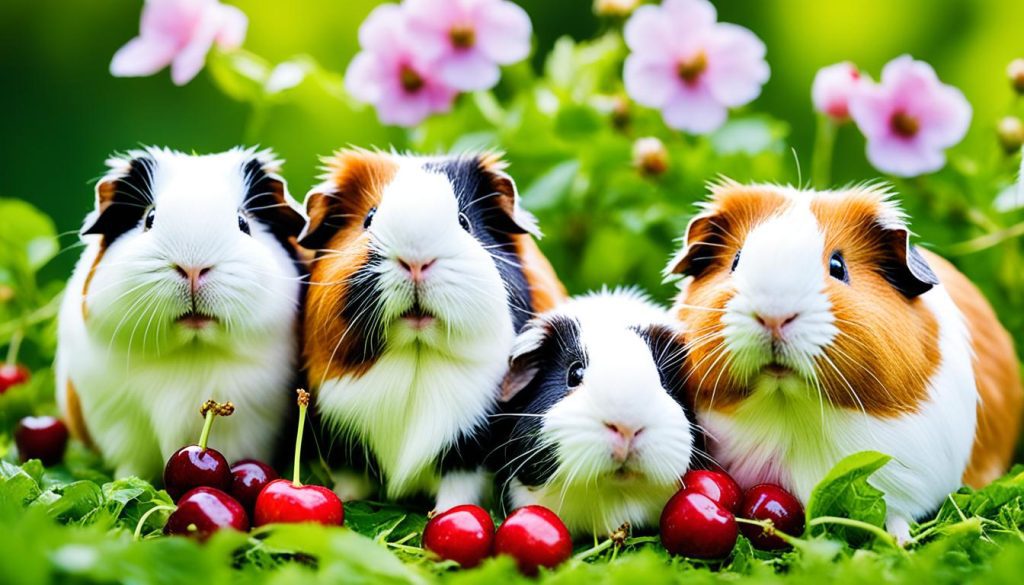
The vitamin C content in cherries is particularly important for guinea pigs, as they are unable to synthesize this vitamin on their own. Vitamin C boosts their immune system, helps in wound healing, and supports collagen production. Calcium and phosphorus are essential for maintaining healthy bones and teeth. The high water content in cherries aids in hydration, contributing to overall well-being.
While cherries offer these nutritional benefits, it’s crucial to remember that they should be given in moderation. Too many cherries can lead to an imbalance in the guinea pig’s diet, potentially causing digestive issues or weight gain. Always consult with a veterinarian to ensure that cherries and other foods are suitable for your guinea pig’s specific needs.
Risks of Feeding Cherries to Guinea Pigs
While cherries can be beneficial for guinea pigs, it’s important to be aware of the potential risks associated with feeding them cherries.
The acid content in cherries can cause sores on their lips if consumed in excess.
Guinea pigs have sensitive skin, and the acid in cherries can irritate their lips, leading to discomfort and potential sores if consumed in large quantities. It’s important to monitor their intake and ensure that cherries are given in moderation.
Cherries do not provide enough fiber to meet guinea pigs’ dietary needs, which can lead to constipation.
Guinea pigs require a diet high in fiber to maintain a healthy digestive system. While cherries contain beneficial nutrients, they lack sufficient fiber, which can result in constipation if they become a significant part of the guinea pig’s diet. It’s important to ensure that their diet includes other fiber-rich foods to prevent constipation.
Overconsumption of cherries can result in glucose spikes and potential weight gain for guinea pigs.
Cherries contain natural sugars, including glucose, which can lead to spikes in blood sugar levels when consumed excessively. This can be problematic for guinea pigs, as they are prone to certain health issues, such as obesity and diabetes. It’s crucial to limit their intake of cherries to avoid these potential glucose spikes and prevent unwanted weight gain.
Risks of Feeding Cherries to Guinea Pigs:
| Risk | Description |
|---|---|
| Sores on lips | The acid content in cherries can cause sores on guinea pigs’ lips if consumed in excess. |
| Constipation | Cherries do not provide enough fiber, which may lead to constipation in guinea pigs. |
| Glucose spikes | Overconsumption of cherries can result in glucose spikes and potential weight gain for guinea pigs. |
How to Safely Feed Cherries to Guinea Pigs
When it comes to feeding cherries to your guinea pigs, their safety should be your top priority. Follow these guidelines to ensure a safe and enjoyable treat for your furry friends:
- Choose fresh cherries: Select ripe, fresh cherries that are not overly soft or bruised.
- Thoroughly wash the cherries: Rinse the cherries under cool running water to remove any pesticides or dirt that may be present on the skins.
- Remove pits and stems: Before serving the cherries to your guinea pigs, make sure to remove the pits and stems. These parts can pose a choking hazard or cause digestive issues.
- Slice the cherries: To make it easier for your guinea pigs to eat, consider slicing the cherries into smaller pieces. This will also help prevent any choking incidents.
Remember, cherries should be given as a small treat and not be a main part of your guinea pigs’ diet. Monitor their intake and observe their behavior to ensure they are tolerating cherries well. If you notice any adverse reactions, discontinue feeding cherries and consult with a veterinarian.
Now you can confidently offer your guinea pigs a delicious and safe cherry treat!
My Thoughts on Feeding Cherries to Guinea Pigs:
“Feeding cherries to guinea pigs can be a fun way to enhance their diet. By following the proper safety measures and monitoring their intake, you can provide them with a tasty and nutritious treat. Just remember to prioritize their health and well-being above all else!”
Alternatives to Cherries for Guinea Pigs
While cherries can be given to guinea pigs in moderation, it’s important to provide them with a variety of snacks. This ensures a balanced diet and helps to prevent boredom. Here are some alternative fruits and vegetables that are guinea pig-friendly and offer nutritional benefits:
Vegetables
- Summer Squash
- Cabbage
- Pumpkin
- Basil
- Spinach
- Bell Pepper
- Cucumber
Fruits
- Apples (without seeds and core)
- Berries (strawberries, blueberries, raspberries)
- Oranges (small pieces)
- Melon (watermelon, cantaloupe)
- Pears (without seeds)
These alternatives to cherries provide a range of vitamins and minerals that support guinea pigs’ overall health. Remember to introduce new foods gradually and monitor your guinea pig’s reactions for any adverse effects. It’s also essential to wash all fruits and vegetables thoroughly to remove any pesticides before feeding them to your guinea pig.
Offering a variety of guinea pig-friendly snacks ensures that your furry friend gets the necessary nutrients from a well-rounded diet. Remember, moderation is key when providing treats, including fruits and vegetables, as they should not exceed 10% of your guinea pig’s daily food intake. Consulting with a veterinarian can help you create a personalized diet plan that meets your guinea pig’s specific needs.
Potential Harmful Foods for Guinea Pigs
While cherries can be safely given to guinea pigs, it’s important to be aware of certain foods that should be avoided in their diet. Feeding guinea pigs the wrong foods can have harmful or even toxic effects on their health. Here are some foods that you should not feed your guinea pig:
- Avocados
- Jalapenos
- Okra
- Olives
- Raisins
These foods can cause digestive issues, discomfort, and other health problems in guinea pigs. Avocados, for example, contain a substance called persin that is toxic to guinea pigs and can lead to diarrhea and breathing difficulties. Jalapenos and other spicy foods can irritate their sensitive digestive system, causing discomfort and potentially damaging their internal organs. Okra and olives, due to their high fat content, can lead to obesity and other health complications. Raisins, while enjoyed by humans, can cause kidney damage in guinea pigs.
To ensure the safety of your guinea pig’s diet, it’s crucial to do thorough research and consult with a veterinarian or a knowledgeable source. They can provide you with a comprehensive list of foods to avoid and guide you in providing a healthy and balanced diet for your furry friend.
“Feeding guinea pigs the wrong foods can have harmful or even toxic effects on their health.”
By being mindful of the potential harmful foods for guinea pigs, you can keep your furry friend happy, healthy, and safe.
Foods to Avoid Feeding Guinea Pigs
When it comes to the diet of guinea pigs, it’s important to remember that some foods that may be safe for humans or other animals can be harmful or toxic for them. These are the potential harmful foods that guinea pig owners should avoid:
| Harmful Foods | Reasons |
|---|---|
| Avocado | Contains the toxin persin, which can cause digestive issues and breathing difficulties |
| Jalapenos | Spicy foods can irritate the guinea pig’s sensitive digestive system and potentially damage internal organs |
| Okra | High fat content can lead to obesity and other health complications |
| Olives | High fat content can lead to obesity and other health complications |
| Raisins | Can cause kidney damage in guinea pigs |
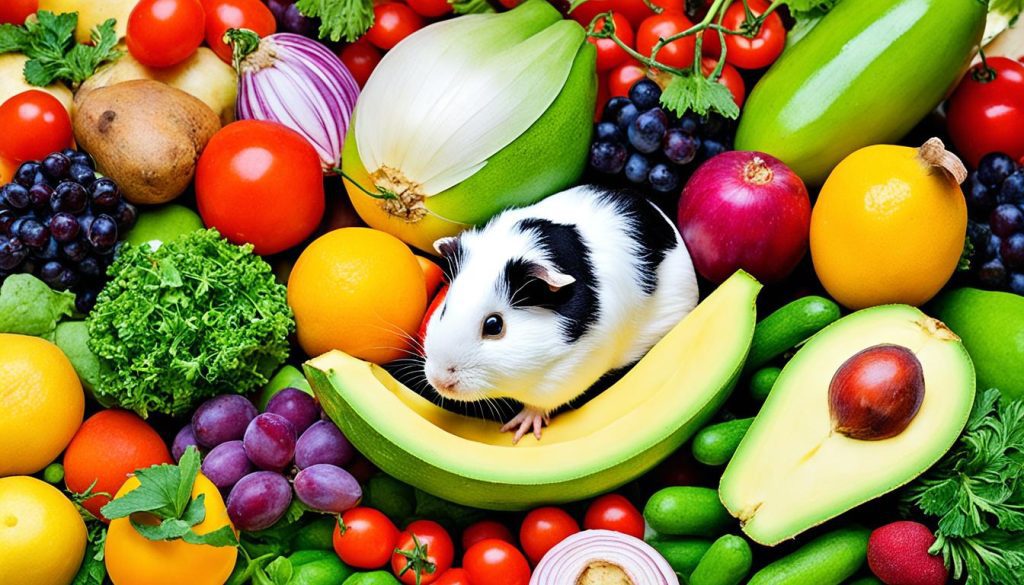
Remember, the well-being of your guinea pig is of utmost importance, and providing them with a safe and appropriate diet is essential for their overall health and happiness.
Conclusion
Guinea pigs can enjoy cherries as part of their diet, but it is essential to feed them in moderation. Cherries provide valuable nutrients like vitamin C, which is vital for their overall health. However, cherries should not be the main component of their diet and should be considered as a special treat.
It is crucial to understand both the benefits and risks of feeding cherries to guinea pigs. While cherries contain beneficial vitamins and minerals, excessive consumption can lead to adverse effects such as lip sores and constipation. Monitoring their cherry intake and opting for a balanced diet with a variety of guinea pig-friendly snacks is key to ensuring their well-being.
Consulting with a veterinarian is always recommended when introducing new foods to your guinea pig’s diet. They can provide valuable guidance and help determine the ideal portion size and frequency of cherry treats. By making informed decisions and prioritizing their overall health, you can safely incorporate cherries into your guinea pig’s diet.

